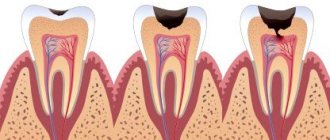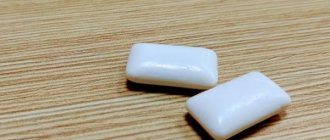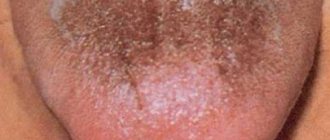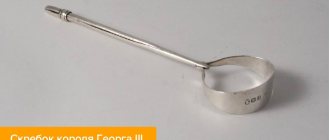What to do if your breath smells and an unhealthy coating appears on your tongue
Language is a kind of indicator by which one can judge a person’s health. Ideally, it should have a natural pink color, with a slight whitish, almost transparent coating. But signs of inflamed mucous membranes, redness and the presence of dense, unhealthy discharge should at least alert you. If a smell is added to everything else, you should immediately see a doctor - these could be signs of a tongue disease or a variety of malfunctions in the functioning of internal organs and systems. Today we will look at the reasons why an unpleasant odor appears due to plaque on the tongue and what pathological processes can contribute to this.
Bad breath, what is the reason?
What to do if you have a bitter taste in your mouth and a white coating on your tongue
Some medications cause a bitter taste. These include lithium preparations, antidepressants, antibiotics, allopurinol, vitamin and mineral complexes. Bitterness in the mouth can be combined with nausea, dryness, and a white coating on the tongue. Usually, special treatment for bitterness in the mouth after taking antibiotics or other medications is not required. The unpleasant taste disappears upon completion of the course of treatment and no longer bothers you.
What should you do if you have a bitter taste in your mouth and a white coating on your tongue that persists for a long time after taking medications? Contact your doctor. It may be necessary to prescribe hepatoprotectors - drugs that restore liver function. The treatment regimen for some diseases initially includes medications that “protect” the liver. This approach is practiced when prescribing chemotherapy drugs, especially with long courses and high dosages.
What causes the tongue to become coated and cause halitosis?
The combination of halitosis (bad breath) and the formation of a thick, suspicious coating on the tongue is a clear sign of problems in the functioning of certain body systems. This is not only obvious discomfort for a person, but also a signal that you need to visit a doctor. Here it is important to identify the true cause of the symptoms, the elimination of which will allow you to get rid of these unpleasant manifestations. So, a coated tongue and an unhealthy odor indicate the following points:
- low level of hygiene, due to which food residues accumulate on the teeth and mucous membranes, and this is a direct path to the rapid proliferation of bacteria,
- advanced form of caries,
- digestive problems
- problems related to the endocrine system,
- pathologies associated with the kidneys and liver,
- taking antibiotics and other powerful medications for an extended period of time,
- some diseases of the tongue.
On a note! It is not at all necessary that halitosis is a sign of some pathology. An unpleasant odor can also occur for other reasons that have nothing to do with diseases. For example, as a result of consuming certain foods, smoking or drinking alcohol. Toothpaste and a brush will come to the rescue. But an unnatural white or yellowish plaque in the oral cavity is a reason to consult a specialist for advice.
A disease such as candidal stomatitis, a fungal infection, can provoke the formation of cheesy plaque. Another common tongue disease is glossitis, which is accompanied by inflammatory processes in the tissues of the organ. But more often such discharge, combined with a bad odor, becomes a sign of disturbances in the gastrointestinal tract. For example, with gastritis, a dense white or yellowish film is often noted that covers the entire tongue. In addition to it, there is a feeling of insufficient moisture in the oral mucosa, a suspicious taste with bitterness or a sour tint.
This is what a fungal infection on the tongue looks like
“When I started to develop a noticeable white coating on my tongue, I immediately rushed to the dentist. The situation was still clouded by a sour smell, but I was sure that it was all due to some kind of dental disease. I brush my teeth strictly twice a day and try to maintain good hygiene, so these symptoms came as a real shock to me. But the doctor examined him, found nothing and sent me to a gastroenterologist. It was there that it turned out that I had gastritis! Maybe it’s been there for a long time, it’s just that nothing bothered me...”
Lyubochka91, Vladivostok, from correspondence on the woman.ru forum
If gastritis becomes chronic, the plaque usually becomes yellowish and denser. Ulcers of the stomach and duodenum manifest themselves as grayish discharge on the tongue1. In addition, the oral mucosa can change its color due to diseases of the ENT organs - scarlet fever or tonsillitis.
Other causes of bitterness in the mouth
Why there is a constant bitter taste in the mouth - possible reasons:
- smoking;
- inhalation of vapors of certain chemicals;
- dehydration;
- glossitis;
- dry mouth;
- allergy;
- salivary gland infections;
- lack of zinc and vitamin B12;
- nasal polyps;
- autoimmune diseases such as Sjögren's syndrome and Bell's palsy;
- mouth breathing;
- inflammatory diseases of the upper respiratory tract;
- injuries to the head, mouth, nose;
- braces;
- Radiation therapy to the neck or head.
Bitterness in the mouth in the early stages of pregnancy may be associated with changes in hormonal levels, attacks of nausea and vomiting (toxicosis). Read more about this symptom on our website.
What consequences can there be due to “dirty” language?
A tongue with an unnatural coating indicates that rapid proliferation of bacteria occurs on the upper layer of the organ's epithelium. The appearance of an unpleasant odor is not so bad. The danger of this phenomenon lies in the fact that during a meal a person involuntarily swallows part of the accumulated secretions, which can ultimately lead to intoxication of the body.
If the problem is not addressed, it can lead to decreased immunity.
Exceeding the permissible limit of bacteria in the oral cavity, toxins and fungal infections - all this leads to an inevitable decrease in immunity, due to which a person becomes more susceptible to various viruses and infections. At the same time, it will not be possible to mask the smell for a long time with the help of mint chewing gum and regular cleaning. It is necessary to find the root of the problem and eliminate it, especially since the reason may lie in serious pathological processes that can lead to dangerous complications for the entire body.
Diagnosis of the problem
As mentioned above, a white or yellow tongue most often indicates problems with digestion. However, first it is better to visit a dentist so that he can rule out possible oral diseases that provoke the appearance of similar symptoms. If the doctor does not find other signs indicating dental disease, the patient will be referred to a gastroenterologist, virologist or endocrinologist.
If you find a problem, you need to contact a specialist
As part of the diagnosis, an ultrasound examination of organs located in the abdominal cavity, x-rays of internal organs, gastroduodenoscopy, urine, blood and stool tests can be performed.
Types of plaque
Plaque on the tongue varies in its characteristics, which are taken into account to make an accurate diagnosis. For example, the density of discharge plays an important role, which can tell a lot about the extent of the problem. The consistency is also taken into account - it can be wet or dry, fatty or curdled. The diagnosis will largely depend on accompanying manifestations, such as bad breath, the presence of inflammation on the mucous membrane, ulcers and other neoplasms.
However, the main visual criterion when making a diagnosis is the color of the discharge - white, as a rule, indicates candidal stomatitis or gastritis, while yellow usually results from prolonged antibiotic treatment or serious problems in the functioning of the gastrointestinal tract. But besides this, in medical practice there are often situations when the tongue takes on a completely unexpected color:
- brownish – alcohol abuse, problems with digestion and gallbladder function,
- gray – ulcerative processes in the stomach and duodenum, prolonged use of antibiotics,
- orange – acute gastrointestinal conditions,
- bluish – anemia caused by acute deficiency of vitamins and microelements,
- black – Crohn’s disease, intoxication of the body, liver pathologies,
- greenish – constant consumption of harmful foods, liver dysfunction.
Plaque on the tongue can be varied.
The localization of the discharge can tell a lot about the problem. For example, sometimes plaque covers the entire surface of an organ or even the oral cavity, in other cases it is concentrated only at the root, on the sides or at the tip. The discharge may be speckled or thick plaques. The doctor must take all these characteristics into account when making a diagnosis.
How to remove these symptoms
So, how to get rid of plaque on your tongue and what to do about the smell? The essence of treatment comes down to eliminating the true cause of the problem. If poor hygiene is to blame, it is enough to visit the dentist for professional cleaning of plaque and dental deposits. In the future, you should take care of your oral health, regularly brush your teeth and undergo preventive examinations. But what if everything is not so simple, and the cause of such annoying manifestations is pathological conditions. In this case, the treatment method will be selected taking into account the specific disease:
- dental problems: a specialist will heal carious cavities, and if plaque and odor appear from a tongue disease, appropriate treatment will be prescribed using antiseptic, antifungal, anti-inflammatory drugs or antibiotics,
- systemic pathologies: first you will have to undergo examination by specialized specialists. Only after the diagnosis has been confirmed, the doctor will be able to prescribe the necessary therapy, during which the symptoms will gradually disappear by themselves,
- bad habits: when the cause of the problem is an addiction to tobacco smoke or alcohol, the only way out is to give up bad habits or at least minimize them.
You can get rid of the unpleasant odor using pharmaceutical products.
During treatment, you can remove discharge with a regular toothbrush, but it is better to consult a doctor about this. If the tissues are inflamed, such cleaning may be contraindicated. But you can get rid of the unpleasant odor using pharmaceutical rinses or decoctions of medicinal herbs - St. John's wort, chamomile, nettle, sage or mint. Remember: this is only a temporary measure to muffle obvious symptoms that cause some discomfort in everyday life. However, hiding the signs of a problem is not the same as solving it.
Bad breath. Causes. Treatment.
This is the result of a condition also known as halitosis. This problem is by no means insoluble. Methods for its treatment are usually very simple and effective - you just need to correctly recognize the main cause of the unpleasant odor. In most cases, it occurs due to the accumulation of a large number of bacteria in a person’s mouth.
Do you have bad breath?
Does your breath “smell” normal? Not sure? Of course, under certain circumstances, each of us may experience bad breath, and we ourselves can only find out about this by the reactions of the people around us. Determining whether you have bad breath can often be difficult, primarily because the mouth, the source of all these odors, is connected to the nose through an opening at the back of the mouth, in the area of the soft palate. And since the nose “filters” odors that arise in the back of the mouth, it also filters this most unpleasant odor. That is, it is quite possible that you have this bad breath - but you yourself don’t know about it.
How can you find out about this?
If even our own noses can't help us determine with certainty what our breath smells like, can we still know? One way is to ask someone in your immediate family for an opinion on this matter. You can also make the same request to a close friend, or to your dentist during your next visit to him. If this question seems too personal to you and you are afraid to “entrust” it to adults, do not be embarrassed and ask your children about it. As we well know, it is through their mouths that the truth often speaks.
Is it possible to independently determine what your breath smells like?
Such methods are also known. For example, lick your wrist, let the saliva dry for about five seconds, and then smell the area. So how? That's pretty much what you smell like. Or, to be precise, this is what the front of your tongue smells like.
Now try to figure out what the back of your tongue smells like. Take a spoon, turn it over, and scrape the farthest part of your tongue with it. (Don't be surprised if you start choking when you do this.) Look at the remaining substance on the spoon that you scraped off your tongue - it is usually thick and whitish. Now smell it. This is the smell of your breath (as opposed to the smell of the front of your tongue) that others are likely to smell.
The main cause of bad odor is...
Now you know that in most cases, the source of bad breath is the white substance that covers the back of the tongue. Or, to be more precise, the bacteria that live in this white substance. (Another, also very common cause of bad odor is bacteria that accumulate in other areas of the mouth.)
What conditions or circumstances can cause or increase an unpleasant odor?
Many of these factors are somehow related to:
- Oral bacteria.
- Conditions that stimulate the growth of these bacteria.
- Poor cleaning of areas where bacteria accumulate.
Can food cause an unpleasant odor?
Some foods have a long-standing reputation for causing unpleasant odors, such as onions or garlic. When food is digested, the molecules that make it up are absorbed by our body and then removed from it through the bloodstream. Some of these molecules, which have very characteristic and unpleasant odors, enter our lungs along with the bloodstream. They are removed from the lungs when you exhale - hence the unpleasant odor. Although this kind of unpleasant odor is a rather annoying problem, we will not discuss it in detail on these pages. The unpleasant odor caused by eating certain foods usually disappears on its own after a day or two, once the body has eliminated all the “bad-smelling” molecules. And getting rid of such a smell is quite simple - you just need to exclude such foods from your diet or reduce their consumption to a minimum.
Does smoking cause bad odor?
You've probably met people who smoke heavily and whose breath has a specific smell. Although many factors influence the formation of the unpleasant odor associated with smoking, the main ones are nicotine, tar and other foul-smelling substances contained in tobacco smoke. These substances accumulate on the teeth and soft tissues of a smoker's mouth - gums, cheek tissue, tongue. And let’s make a reservation again - we will not discuss this type of unpleasant odor in detail on these pages either. The only way to completely get rid of this odor is to quit smoking (although if you improve your oral hygiene, this odor can be reduced somewhat). Note also that smoking itself dehydrates the tissues of the mouth. This weakens the moisturizing and disinfecting effect of saliva, which washes away bacteria and their metabolic products. Dry mouth is discussed in more detail below. It is known that people who smoke are more likely to experience problems associated with periodontal disease (“gum disease”). Periodontal diseases also occur due to bacterial activity. Gum disease and its connection to bad odor is discussed in more detail below.
Does xerostomia (dry mouth) contribute to bad breath?
Even if you don’t have any particular problems with unpleasant odor, you’ve probably noticed that in the morning when you just woke up, your breath is much less fresh. This happens because our mouth “dries out” at night - because during sleep our body produces less saliva. The result of this drying out is “morning breath”. A similar “drying effect” is often noticed, for example, by teachers or lawyers who have to talk for several hours - this also causes their mouths to dry out. Some people suffer from chronic dry mouth, a condition called xerostomia. It is even more difficult for them to solve problems with fresh breath. Moisture in our mouths helps cleanse. We constantly swallow saliva - and with each swallow, millions of bacteria are washed out of our mouth, as well as the food particles that these bacteria feed on. In addition, saliva dissolves and washes away the waste products of bacteria living in the mouth.
Saliva is a special form of liquid that moisturizes the mouth, a kind of natural cleanser for the mouth. Any moisture can have a cleansing and dissolving effect; saliva, in addition, contains special components that kill bacteria and neutralize their waste products. When your mouth dries out, the beneficial effects of saliva are greatly reduced. Neutralization of bacteria slows down and conditions for their growth improve. Chronic dry mouth - xerostomia - can also be a side effect of taking certain medications. Xerostomia can be caused by antihistamines (allergy and cold medications), antidepressants, medications that regulate blood pressure, diuretics, tranquilizers, and narcotics. Dry mouth can get worse as you age. Over time, our salivary glands stop working with the same efficiency, and the composition of saliva also changes. This leads to the fact that the cleansing properties of saliva weaken. People who suffer from xerostomia for a long time are more likely to develop periodontal disease (gum disease). Gum disease can also cause bad breath.
Can periodontal disease cause bad odor?
Periodontal disease, commonly referred to simply as “gum disease,” can also cause bad breath. Ask any dentist - the smell of gum disease is very specific, and an experienced doctor can determine the presence of such a disease even before examining the patient. Periodontal disease is the second most common cause of bad breath (the first, as you remember, is the accumulation of bacteria). They occur more often in people over 35 years of age - that is, the older a person is, the more likely it is that problems with fresh breath are caused by the condition of his gums. Periodontal disease is a bacterial infection of the soft tissues surrounding the teeth. If such a disease is neglected, it can lead to serious damage to the bone into which our teeth are “inserted.” Often, as this disease progresses, gaps form between the teeth and gums (dentists call them “periodontal pockets”) where large amounts of bacteria accumulate. These pockets can be so deep that they are difficult to clean properly; bacteria and their metabolic products that accumulate in them also cause an unpleasant odor.
Can a respiratory disease cause an unpleasant odor?
Of course it can. Diseases of the upper respiratory tract, allergies - all these diseases lead to the fact that mucous secretions begin to flow from the nasal cavity into the oral cavity, through the opening in the soft palate. The accumulation of these secretions in the mouth can also cause an unpleasant odor.
People with sinus disease often have a stuffy nose, forcing them to breathe through their mouth. Breathing through the mouth causes it to dry out, which, as we already know, also causes an unpleasant odor. For sinus disease, antihistamines (anti-allergic) medications are often taken, which also contribute to dry mouth.
What dental diseases can cause an unpleasant odor?
In most cases, the occurrence of unpleasant odor in the mouth is associated with various diseases of the oral cavity itself. Any active infection in the mouth, such as an abscessed tooth or partially erupted wisdom tooth, can cause an unpleasant odor. Extensive, untreated cavities on teeth can accumulate large amounts of bacteria and food debris, which also cause an unpleasant odor. If you have such diseases, during your examination your dentist will definitely identify them and offer effective treatment methods.
Can other untreated diseases cause bad odor?
Some diseases of the internal organs can also cause bad breath, although a more common cause is the accumulation of bacteria in the mouth. If the patient has tried all the usual methods for eliminating an unpleasant odor in such cases, but they have led nowhere, then a visit to a therapist will not hurt. Your doctor, of course, knows which diseases are most likely in your case; but, for general information, bad breath can occur with diseases of the respiratory tract, liver, kidneys, and gastrointestinal diseases.
Can dentures cause bad odor?
Dentures (full, partial, removable, etc.) can have a significant impact on the freshness of your breath. If you wear any dentures, there is a simple test you can do to see if your dentures are causing bad odor:
Remove your dentures and place them in a closed container, such as a plastic lunch box. Close it tightly and leave it like that for five minutes. Then open it sharply and immediately smell it. This is roughly what the people you talk to smell like from your mouth.
Although most cases of bad breath are caused by the buildup of bacteria on the tongue, on or around the teeth (periodontal disease), bacteria can also accumulate on the surface of dentures and cause bad breath.
What is actually the main cause of unpleasant odor?
In most cases, the occurrence of bad breath is associated with the condition of the oral cavity. Namely, the unpleasant odor is usually caused by bacteria living in it. Bacteria, like humans, consume food and excrete waste throughout their lives. The waste products of some types of bacteria are sulfur compounds, and they are the cause of the unpleasant odor. Remember what a rotten egg smells like? This smell is also caused by the formation of a sulfur compound in the egg - hydrogen sulfide. The characteristic smell of compost heaps or barnyards also owes its “fragrance” to the presence of a sulfur compound - methyl mercaptan. And both of these compounds are released by bacteria that live in our mouths. These substances are collectively called “volatile sulfur compounds” (VSCs). The term "volatile" means that these substances evaporate quickly, even at normal temperatures. The “volatility” of these compounds explains their ability to quickly penetrate, so to speak, into the noses of the people around us.
What types of bacteria cause bad odor?
Most chemical compounds that cause an unpleasant odor (hydrogen sulfide, methyl mercaptan, cadavrine, putrescine, skatole) are secreted by anaerobic bacteria (more accurately called gram-negative anaerobes). The term "anaerobic" means that they live and reproduce best in places where there is no oxygen. In our mouths, there is a constant struggle for living space between bacteria that produce products that create an unpleasant odor, and other bacteria that do not. The freshness of our breath is determined, strictly speaking, by the degree of balance in the presence of both bacteria. Accumulation of plaque (the white film that forms on the tongue and teeth - at the gum line and below) can tip this balance in favor of odor-producing bacteria. Imagine - a layer of plaque only one or two tenths of a millimeter thick (that is, approximately the thickness of a banknote) no longer contains oxygen at all - that is, there is no better place for bacteria. Therefore, as plaque accumulates, it is inhabited by more and more bacteria that create an unpleasant odor - which means that each of our exhalations contains more and more compounds released by these bacteria.
What do anaerobic bacteria that produce an unpleasant odor feed on?
Most of the foul-smelling substances that cause bad breath are released by bacteria after consuming proteins. That is, when we eat foods such as meat or fish, the bacteria living in our mouth also receive their share of food. And what they secrete after eating are the very compounds that cause an unpleasant odor. Anaerobic bacteria will find proteins - their favorite food - in anything, even the cheeseburger you eat. In addition, in our mouths there is always “natural” protein food for them - for example, dead skin cells, or numerous protein components contained in saliva. If you do not regularly use a toothbrush and floss, a real feast for bacteria will form in your mouth - leftover food from today's breakfast, yesterday's dinner, the day before yesterday's lunch...
Which foods contain the most protein?
Meat, fish and seafood, eggs, dairy products (milk, cheeses and yoghurts) - all these products contain a lot of protein. Most people get about two-thirds of their protein needs from them. Other sources of protein are cereals and products made from them, nuts, leguminous plants (peas, beans and lentils). The ingredients found in many of our favorite desserts (like cakes and pies) make these delicious foods protein pantries.
Where do the bacteria that cause bad odor live?
In most cases, these bacteria accumulate on the tongue, but they have many other “habitats”.
Language
Remember the “experiment” we recommended you do at the beginning of this section. Although the odor produced in the front area of our tongue may not be the most pleasant, it is usually not the main source of problems with fresh breath. The main “component” of the unpleasant odor is formed in the back of the tongue. Go to the mirror, stick out your tongue and look at it carefully. You will probably see a whitish coating on its surface. Closer to the back of the tongue, this coating becomes denser. The amount of bacteria that accumulates on the human tongue depends on the texture of its surface. People whose tongue surface has more folds, grooves and indentations will have more of this amount than people with a smoother tongue surface. In order to create a favorable environment for the life of bacteria in the white layer of the tongue - i.e. deprived of oxygen - this layer can be only one or two tenths of a millimeter thick. This “oxygen-free” environment is also called “anaerobic”; This is where bacteria live and multiply best. Studies have shown that the number of bacteria on the human tongue directly depends on the thickness of the white layer covering it. And as you can guess, the freshness of your breath depends on the number of bacteria: the fewer there are, the fresher it is.
Periodontal sources
Bacteria that cause an unpleasant odor also feel quite comfortable in areas of the oral cavity other than the tongue. Perhaps you have noticed that while flossing your teeth, an unpleasant odor sometimes also appears. And perhaps this smell becomes more noticeable when you start brushing between your back teeth. In the spaces between the teeth, bacteria that create an unpleasant odor also find refuge. Dentists call these areas “periodontal” (“paro” means “about” and “dont” means “tooth”). Even in a relatively healthy mouth, bacteria can find an oxygen-deprived (anaerobic) environment—for example, under the gum line, around and between teeth. And in people suffering from periodontal disease (“gum disease”), the number of such anaerobic “corners” increases many times over. Periodontal disease often damages the bone that surrounds the teeth. This, in turn, leads to the formation of depressions between the teeth and gums (dentists call them “periodontal pockets”). These pockets are usually very difficult or impossible to clean, and they become an ideal anaerobic environment in which odor-causing bacteria live and thrive.
How to get rid of an unpleasant odor?
Since the main source of bad breath is foul-smelling bacterial secretions (volatile sulfur compounds), the main way to get rid of them is to cleanse the oral cavity in such a way as to:
- Deprive bacteria of nutrients.
- Reduce the amount of bacteria already accumulated in the mouth.
- Reduce the anaerobic environment in which bacteria live and multiply.
- Avoid the formation of new breeding grounds for bacteria.
You can also use cleaners that reduce the activity of odor-causing volatile sulfur compounds.
How to deprive bacteria of nutrients?
As you remember, the main source of bad breath is the foul-smelling waste bacteria produce when digesting proteins. Therefore, people who eat a vegetarian diet (consisting mainly of fruits and vegetables) are less likely to have problems with fresh breath than those who consume a lot of protein foods, such as meat. In addition, it is very important to clean your mouth promptly and correctly, especially after consuming protein-rich foods. After finishing breakfast, lunch or dinner, tiny particles of food remain in our mouths, which get stuck between the teeth and also settle in a white coating on the back of the tongue. And since it is in these places that anaerobic bacteria accumulate, causing an unpleasant odor, then, without properly cleaning your mouth after eating, you will thereby provide them with a sufficient amount of nutrients for a long time.
To get rid of unpleasant odor, you need to brush your teeth and gums
The bacteria that produce products that cause bad breath also live in the plaque that accumulates on the teeth and gum line. In order to reduce this plaque, prevent its further accumulation and remove food debris that “lingers” in the mouth and serves as food for bacteria, it is necessary to thoroughly clean the teeth and gums with a toothbrush and dental floss. Let us remind you about dental floss once again. If you do not thoroughly and daily clean the spaces between your teeth where a toothbrush cannot reach, you will be unlikely to get rid of bad breath.
Visit your dentist
If, after all the measures taken, the bad breath does not disappear, call and make an appointment with us at t. 567-422, where you can not only discuss the problem in detail, but also carry out the necessary procedures to clean your mouth. This may be the best option because:
- Not all people know how to use dental floss and dental floss most effectively. After examining your mouth, your doctor will teach you the necessary techniques.
- Tartar buildup can interfere with effective teeth cleaning. Our dentists will remove it.
- If you are showing signs of periodontal disease (“gum disease”), we can identify them and treat you accordingly. Periodontal disease can seriously damage your teeth and the surrounding bone. This creates deep “pockets” between the teeth and gums in which bacteria accumulate, so deep that they are difficult or even impossible to clean.
- During the examination, your doctor will look for - if any - other untreated conditions that may be contributing to the odor.
- If our doctors find it unlikely that these particular diseases are the cause of the unpleasant odor, we will offer you an appointment with a general practitioner and provide appropriate explanations.
You need to clean your tongue thoroughly
Since most people tend to ignore this procedure, try making it part of your daily oral care routine. Very often, using this method alone - without additional measures - helps eliminate an unpleasant odor. Consider again the “experiment” we recommended you do at the beginning of this section. Then we found that the front of the tongue has a less unpleasant odor than the back. This happens because the front area of the tongue constantly cleans itself - and therefore fewer anaerobic bacteria accumulate on it. As the tongue moves, its front part constantly rubs against the hard palate - this is how cleansing occurs, preventing the accumulation of bacteria. Unlike the front, the back of the tongue during its movement comes into contact only with the soft palate. In this case, effective cleaning is not possible. Therefore, odor-causing bacteria accumulate mainly on the back of the tongue, which is why it is this area that needs periodic cleaning.
How to properly clean your tongue?
There are several ways to clean the back of the tongue, but they all have the same goal - to remove bacteria and food debris that accumulate in this area. When cleaning your tongue, no matter which method you use, you should try to reach as far as possible to clean as much of its surface area as possible. If you start choking, don't be surprised. This is a natural reaction, but over time this reflex should weaken.
How to clean your tongue using a toothbrush or a special brush
You can use a toothbrush or a special tongue brush to clean the surface of your tongue. Start brushing with the furthest areas you can reach, then gradually move the brush strokes (directed anteriorly) towards the front of the tongue. The movements should be made with some pressure on the surface of the tongue - but, of course, not too strong so as not to cause irritation. To clean your tongue more effectively, you can use toothpaste because it contains the same ingredients as mouth cleansers. You can learn more about this on the page dedicated to oral cleaners. Pastes that neutralize volatile sulfur compounds. Since VSCs are what cause bad odor, toothpastes containing VSC-neutralizing agents—such as chlorine dioxide or zinc—will improve the freshness of your breath.
Pastes with antibacterial properties
If the toothpaste you use contains an antibacterial agent - such as chlorine dioxide or cetylpyridone chloride - you can both expel and destroy anaerobic bacteria when cleaning your tongue.
Although brushing your tongue with a toothbrush can provide quite satisfactory results, many people prefer to use a special tongue scraping spoon, believing this method is more effective. Some patients claim that they choke less when scraping their tongue with a spoon than when cleaning it with a toothbrush or special brush. In order to test your reaction to this method, you can conduct a simple experiment. Take a regular spoon from the kitchen (better a teaspoon than a table spoon), turn it over and try to scrape your tongue with it. To do this, touch the back of your tongue with a spoon, press it lightly and pull it forward. Do this carefully, but without effort. Don't scrub too hard, as this may irritate the surface of your tongue. If scraping as a method is not objectionable to you, buy a special spoon designed for this purpose at the pharmacy. It is quite possible that it will clean the tongue more effectively than a teaspoon.
What types of liquid mouth cleaners can help get rid of bad breath?
Liquid mouth rinses, when used along with regular and effective tongue cleaning, brushing and flossing, can also help a lot in getting rid of bad odor. You should not just rely on rinse aids and neglect the other measures listed. The ability of a liquid mouthwash to effectively combat bad breath is associated with some of its properties, namely:
- Antibacterial properties . If the mouthwash has the ability to kill bacteria, it can help reduce the amount of anaerobic bacteria in your mouth. Since it is these bacteria that emit volatile sulfur compounds, which in turn form bad breath, the fewer of these bacteria there are in the mouth, the better.
- Ability to neutralize volatile sulfur compounds. Rinse aids contain components that have the ability to neutralize volatile sulfur compounds and the substances that form them. As you remember, volatile sulfur compounds are foul-smelling substances that create an unpleasant odor. If a purifier is able to reduce their content in your breath, then it will naturally be fresher.
Listed below are some substances that have the ability to effectively neutralize unpleasant odors. These substances are usually included in mouthwashes sold in pharmacies.
- Rinse aids containing chlorine dioxide or sodium chlorite (Antibacterial / Neutralizes volatile sulfur compounds)
Many dentists believe that rinses containing chlorine dioxide or its constituent sodium chlorite play a critical role in neutralizing bad breath. Research data suggests that chlorine dioxide has a dual effect:Chlorine dioxide is an oxidizing substance (meaning it releases oxygen). Since most odor-causing bacteria are anaerobic (that is, they prefer to live in places where there is no oxygen), exposure to an oxidizing agent helps reduce their numbers, which consequently reduces the unpleasant odor.
Chlorine dioxide also affects the level of volatile sulfur compounds in the mouth. It neutralizes those compounds that bacteria have already released, and at the same time destroys those substances from which these compounds are subsequently formed. The result is that the concentration of volatile sulfur compounds in the mouth decreases sharply, and the breath, of course, becomes cleaner.
- Rinse aids containing zinc (Neutralizes volatile sulfur compounds)
Research has shown that rinses containing zinc ions can also reduce the concentration of volatile sulfur compounds. It is believed that this is due to the ability of zinc ions to destroy those substances from which bacteria “make” sulfur compounds. - "Antiseptic" type rinses (Antibacterial) >
"Antiseptic" cleaners (such as Listerine and its equivalents) are also considered suitable odor neutralizers. The effectiveness of these products is related to their ability to kill bacteria that produce volatile sulfur compounds. However, “antiseptic” rinses themselves cannot destroy these compounds. Many dentists believe that “antiseptic” rinses are not the best choice. These claims are also due to the fact that “antiseptic” mouthwashes have a high alcohol content (often around 25 percent). Alcohol is a strong desiccant (dehydrating agent) and therefore dries out the soft tissues of the mouth. And if you remember our section on xerostomia, dry mouth can be one of the causes of unpleasant odor. - Rinses containing cetylpyridone chloride (Antibacterial)
Cetylpyridinium chloride is a component that is sometimes included in liquid mouthwashes. Having an antibacterial effect, it helps reduce the number of anaerobic bacteria. Do mint tablets, lozenges, drops, sprays and chewing gum help get rid of unpleasant odor?So are liquid rinses, mints, lozenges, drops, sprays, chewing gum, etc. By themselves, they are not the most effective means of eliminating unpleasant odors. However, when these products are used in combination with careful and regular tongue cleaning, brushing and flossing, their effects can be quite beneficial - especially if they contain substances (such as chlorine dioxide, sodium chlorite and zinc) that can neutralize volatile sulfur compounds. connections. In addition, mints, lozenges, and chewing gum stimulate saliva production. And we already know that saliva cleanses the oral cavity of bacteria and their secretions, which means it helps get rid of unpleasant odor.
How to use liquid mouthwash to achieve the greatest effect?
Bacteria that create an unpleasant odor live both on the surface and in the depths of the white plaque that accumulates on and around the teeth, gums, tongue. An antibacterial rinse by itself cannot penetrate into the depths of this plaque, and therefore, before using such a cleaner, it is better to remove as much plaque as possible using your usual methods - scraping your tongue, brushing and flossing your teeth. Rinsing your mouth with mouthwash after these procedures will help remove any remaining bacteria. You don’t just need to put the mouthwash in your mouth, but rinse it properly. Before rinsing, say “ah-ah” - this will allow you to stick out your tongue, so that the rinse gets to the back of it, where bacteria accumulate. After rinsing, the rinse aid should be immediately spit out. This is why children should not be allowed to use mouthwash - they may accidentally swallow it.
How to clean dentures
If your dentist has installed dentures in your mouth, he or she must explain to you how to properly clean them. Because bacteria accumulates on your dentures just as it does on your natural teeth, tongue, and gums, your doctor will advise you to clean your dentures with a regular toothbrush or a special brush, both the outside and inside of them. After cleaning the dentures, they should be placed in a container with an antiseptic liquid (your dentist will also advise you on which one).
What measures can you take on your own to get rid of an unpleasant odor?
Drink more water
Oddly enough, drinking plenty of water throughout the day will also help you reduce bad odor. If there is a lack of water, your body will try to retain it, which will reduce the production of saliva, and it will be less effective at dissolving and washing away bacteria and their secretions, which create an unpleasant odor. Drinking enough water every day is especially important for those suffering from xerostomia (chronic dry mouth).
Rinse your mouth with water
Rinsing your mouth with plain water will also help relieve bad odor for a short period of time. Rinsing also dissolves and washes away bacterial secretions that harm the freshness of your breath.
Stimulate saliva production
This will also help you reduce bad odor. You remember that saliva cleanses the mouth, dissolving and washing away bacteria and their secretions. The easiest way to stimulate saliva production is to chew something. When you chew—anything—your body thinks you're eating food, so it signals it to increase saliva production. (Saliva is a very important component in digesting food.) You can, for example, chew clove seeds, dill, mint or parsley. Peppermint tablets, chewing gum and mint candies help salivation. But: if you prefer these products, make sure they do not contain sugar. Sugar promotes the growth of bacteria that can cause tooth decay.
Health to you and your teeth!
Head of the Medi clinic, dentist Shubin S.A.
Online registration for consultation
T.567-422, 44-52-86
Oral hygiene
Constant oral care, maintaining a proper level of hygiene and a responsible approach to the health of your body is an excellent prevention of many dental and other diseases, including those that provoke the symptoms in question. Experts advise following these recommendations to minimize the risk of halitosis and oral discharge:
- daily hygiene, cleaning at least 2 times a day, and even better - after each main meal,
- rinsing your mouth after meals and even snacks - plain water will do,
- limiting sweets and fatty foods,
- giving up cigarettes and alcohol,
- an active lifestyle and regular consumption of natural foods rich in beneficial vitamins and microelements.
Regular brushing of your teeth and tongue will help avoid the problem.
If you notice the first suspicious signs of the disease, you should consult a doctor. Preventive examinations at the dentist’s office are never superfluous, especially since regular visits to this specialist will identify the problem in the early stages of development, and therefore quickly solve it.
Causes of bitterness in the mouth after eating
The unpleasant taste usually disappears when the cause that caused it is eliminated. Diet errors (fatty, deep-fried foods), smoking, bad teeth, poor oral hygiene, and taking certain medications are potential causes of bad taste. However, dryness and bitterness in the mouth are also symptoms of gastrointestinal diseases. Biliary dyskinesia, chronic cholecystitis, cholelithiasis cause discomfort in the oral cavity. Also, the cause of a bitter taste can be diseases of the duodenum, chronic gastritis, enteritis, and colitis.
How to remove severe bitterness in the mouth and nausea? It is necessary to treat the underlying disease, the manifestations of which are these symptoms. But even after cholecystectomy, unpleasant symptoms may persist. Bitterness in the mouth after gallbladder removal is often associated with the so-called postcholecystectomy syndrome. If, despite following a diet, a bitter taste in the mouth persists for a long time after surgery, you should consult a doctor to identify the cause and prescribe appropriate therapy. The cause of bitterness in the mouth after eating can be simple overeating. In case of a large feast, you can take a tablet of an enzyme preparation (panzinorm, festal, mezim forte) during meals. But it is still advisable to adhere to the rules of a healthy diet: eat small portions 5-6 times a day, eliminate or limit the consumption of fatty and fried foods, drink more water. Then the question “how to treat bitterness in the mouth while eating” will not arise, and “bells” from the liver in the form of an unpleasant taste will not come.
Recommendations for health improvement
The cause of most health problems is reduced immunity. To strengthen and maintain it, procedures for hardening the body will be useful, which are recommended to begin in childhood. In addition, experts advise taking multivitamin complexes from time to time, enriching the diet with fresh fruits and vegetables, and not forgetting the importance of physical activity. You don’t have to buy a gym membership and torture yourself with daily workouts. It is enough to walk every day in the fresh air, visit the pool once a week or, for example, ride a bike. Taking care of your health is the best prevention of any disease.
- Banchenko, G, V. Language is the “mirror” of the body: wedge, a guide for doctors, 2000.










